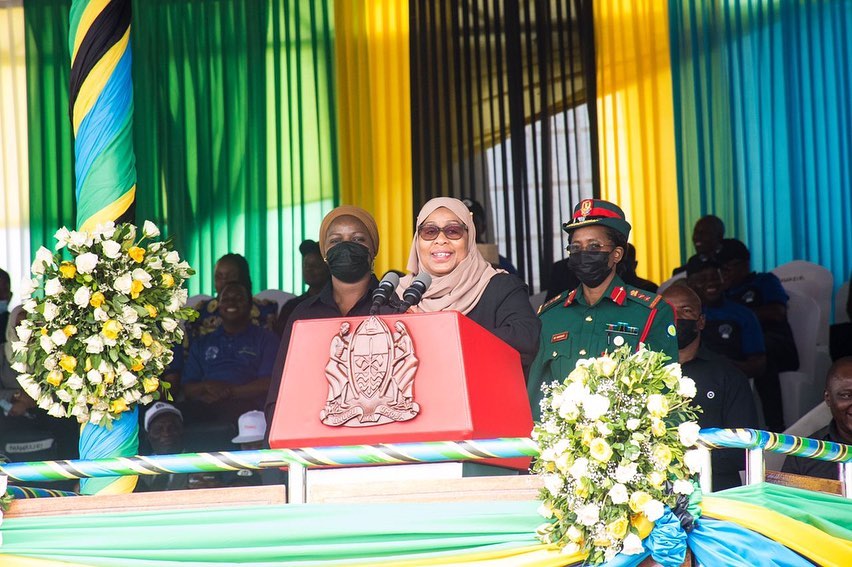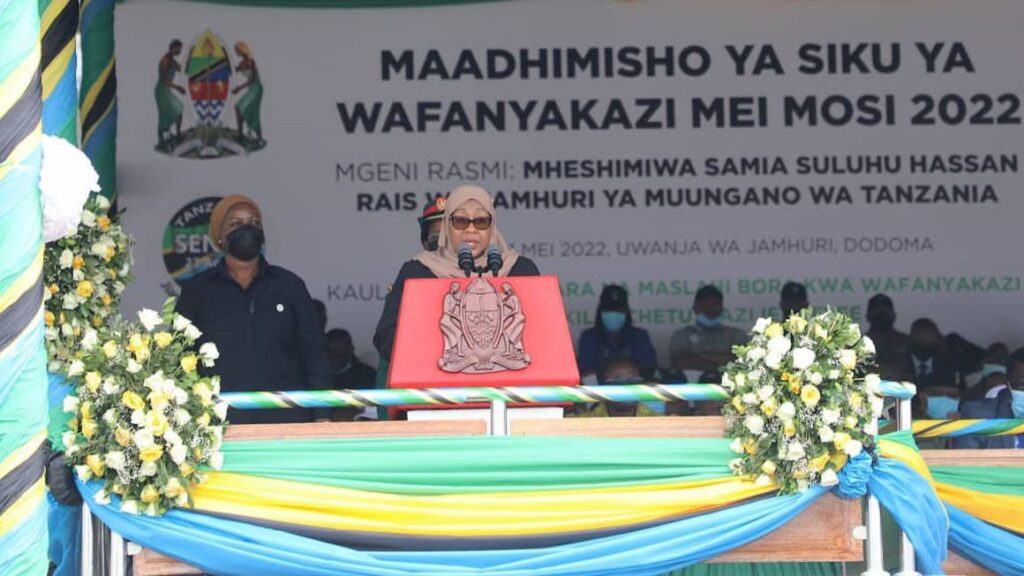
The Head of State states categorically that the government will increase public workers’ salaries in the not-too-distant future, and also outlines several measures being taken to ensure that retirees are paid their benefits without delay

Dar es Salaam. President Samia Suluhu Hassan yesterday assured public sector workers that their salaries would be raised.
She said, however, that the extent of increments would be known once some calculations were concluded.
Addressing the nation on International Workers’ Day from Jamhuri Stadium in Dodoma, President Hassan directed the relevant ministries to lay the ground for salary board meetings.
She also said the government was looking into the possibility of remunerating public workers who were sacked for possessing either Standard Seven or forged academic certificates.
The Head of State issued a number of directives aimed at improving retirees’ welfare.
She said despite the tough economic times being experienced globally, the Sixth Phase Government was committed to making good on its promise to raise salaries.
“Calculations are underway. The extent of the increase will be known later. However, it will not be as has been proposed by Tucta (Trade Union Congress of Tanzania) due to economic challenges being experienced in the country and the rest of the world,” President Hassan said amid cheers from the crowd that packed the stadium.
She added that the government was committed to raising salaries, and take other measures aimed at easing the burden on workers as was the case in the 2021/22 financial year.
“Tucta has carried out two studies on the appropriate minimum wage. However, no study has been carried out into workers’ productivity, which would have played a central role in their discussions with the government. However, this has nothing to do with our issue (salary increment).”
President Hassan said she had noticed during processions that preceded her speech that there were no placards expressing workers’ readiness to work harder for the sake of the economy and the nation at large.
On public workers who were sacked for possessing Standard Seven or forged academic certificates, the Head of State directed the Ministry of Finance and Planning to establish five percent of the amounts contributed by those affected as social security savings.
President Hassan said it should also be established how much should be paid to workers who were sacked two or three years before they retired.
“The government will make a concrete decision on the two groups after the amounts are known.”
On the government’s efforts to ensure that retirees’ benefits were paid without delay, President Hassan said Sh2.17 trillion had been remitted to the Public Services Social Security Fund (PSSF) being undisbursed contributions of members of the now-disbanded Public Sector Pension Fund (PSPF) and the Local Authorities Pension Fund (LAPF).
“The system has been improved, and pensioners now receive their payments within 60 days after retiring as required by law. Employers should start calculating retirees’ benefits six months before retirement in order to reduce unnecessary inconveniences,” she said, adding that preparations should also involve dues from social security funds.
Speaking on the pension calculation formula, President Hassan said the government and Tucta had agreed on 33 percent lump sum payment after a long debate, and urged both sides to expedite and conclude the process.
She added that the government was finalising the analysis of pension funds’ financial positions to see the possibility of providing health insurance to pensioners who contributed for less than ten years.
“In order to address the challenge of delaying the submission of workers’ contributions to pension funds, the government has decided to pay directly from the Treasury. Private employers are now given a one-month grace period to disburse payments before enforcement of legal measures.”
President Hassan also warned traders against raising prices arbitrarily, and directed regional and district commissioners to follow laid-down procedures in evicting petty traders from unauthorised areas.
She also said appropriate action should be taken to curb violent crime perpetrated by youth in urban areas.
The Head of State urged Tanzania to participate fully in the National Census on August 23.
Earlier, Tucta secretary-general Hery Mkunda said minimum salaries of Sh315,000 and Sh720,000 were proposed following research conducted in 2006 and 2014, respectively.
“Neither of the two figures were granted by the government. However, after being denied a salary raise for many years, and taking inflation into consideration, we are proposing a new minimum wage of Sh1,010,000,” he said.
Mr Mkunda thanked the government for measures it had taken in the last 12 months, including reducing Pay As You Earn (PAYE) from nine to eight percent; accepting the 33 percent pension calculation formula, and directing over 40 public institutions to establish workers’ councils.
Others are increasing the age of children benefiting from health insurance from 18 to 21 years; waiving the six percent retention fee, as well as ten percent charges on beneficiaries of higher education loans; promoting over 90,000 public workers, and announcing thousands of employment opportunities.
Welcoming the Head of State, Tucta president Tumaini Nyamuhokya asked President Hassan to consider paying benefits to public employees sacked after being found in possession of Standard Seven and forged academic certificates.
“Also, the private sector salary board should convene its meetings, and come up with minimum wage proposals because Sh100,000 paid recently doesn’t meet the present cost of living,” he said.
Speaking earlier, Prime Minister Kassim Majaliwa thanked trade unions for mobilising citizens’ participation in the August 23 census.
“Preparations are complete by over 80 percent. We expect to reach 100 percent by June,” he said.
The Minister of State in the Prime Minister’s Office (Labour, Employment, Youth and the Disabled), Prof Joyce Ndalichako, told the President that Tanzanian workers were grateful for her efforts in the areas of promotion, payment of workers’ arrears, and employment opportunities.
The Association of Tanzania Employers (ATE) chairperson, Ms Jane Nyimbo, said numerous taxes charged in the country increased the cost of doing business.
“They have become a huge burden to employers as well as further complicating the business environment,” she said.
